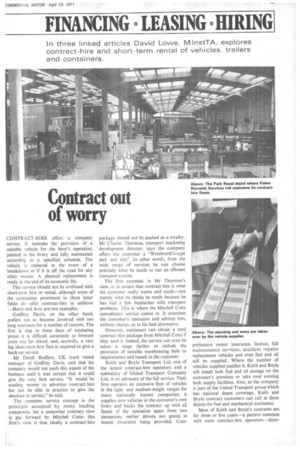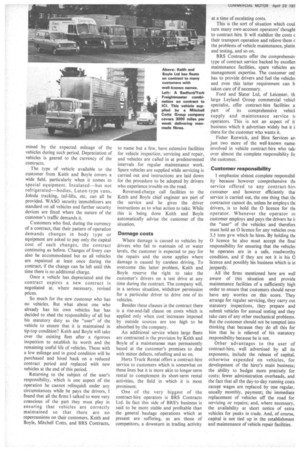Contract out of worry
Page 45

Page 46

If you've noticed an error in this article please click here to report it so we can fix it.
CONTRACT-HIRE offers a complete service. It includes the provision of a
suitable vehicle for the hirer's operation, painted in his livery and fully maintained according to a specified schedule. The vehicle is replaced in the event of a breakdown or if it is off the road for any other reason. A planned replacement is ready at the end of its economic life.
This service should not be confused with short-term hire or rental, although' some of the companies prominent in these latter fields do offer contract-hire in addition —Hertz and Avis are two examples. • Godfrey Davis, on the other hand, prefers not to become involved with too long contracts for a number of reasons. The first is that in these days of escalating prices it is difficult accurately to forecast costs too far ahead, and, secondly, a very big Short-term hire fleet is required to give a back-up service.
Mr Derek Redfern, UK truck rental manager of Godfrey Davis, said that his company would not push this aspect of the business until it was certain that it could give the very best service. "It would be stealing money to advertise contract-hire but not be able in practice to give the absolute in service," he said.
The complete service concept is the principle accepted by many leading companies, but a somewhat contrary view is put forward by Mitchell Cotts: this firm's view is that ideally a contract-hire
package should not be pushed as a totality. Mr Charles Thornton, transport marketing
development director. says the company
offers the customer a "Woolworth's-type pick and mix". In other words, from the wide range of services he can choose precisely what he needs to run an efficient transport system.
The first essential, in Mr Thornton's view, is to ensure that contract-hire is what the customer really wants and needs—not merely what he thinks he needs because he has had a few headaches with transport problems. This is where the Mitchell Cotts consultancy service comes in. It examines the customer's operation and advises him, without charge, as to his best alternative.
However, customers can obtain a total contract-hire package from Mitchell Cotts if they need it. Indeed, the service can even be taken a stage farther to include the provision of suitable warehousing built to requirements and leased to the customer.
Keith and Boyle Transport Ltd, one of the largest contract-hire operators and a subsidiary of United Transport Company Ltd, is an advocate of the full service. Their firm operates an extensive fleet of vehicles in the lightand medium-weight ranges for many nationally known companies; it supplies new vehicles in the customer's own livery and backs the contract up with all facets of the operation apart from two exceptions, neither drivers nor goods in transit insurance being provided. Corn prefiensive motor insurance, licence, full maintenance services, accident repairs replacement vehicles and even fuel and oil will be supplied. Where the number of vehicles supplied justifies it, Keith and Boyle will install bulk fuel and oil storage on the customer's premises or take over existing bulk supply facilities. Also, as the company is part of the United Transport group which has national depot coverage, Keith and Boyle contract customers can call at these depots for fuel and mechanical assistance.
Most of Keith and Boyle's contracts are for three or five years—a pattern common With most contract-hire operators—deter mined by the expected mileage of the vehicles during such period. Depreciation of vehicles is geared to the currency of the contracts.
The type of vehicle available to the customer from Keith and Boyle covers a wide field, particularly when it comes to special equipment. Insulated—but not refrigerated—bodies, Luton-type vans, Joloda tracking, tail-lifts, etc, can all be provided. WASO security immobilizers are standard on all vehicles and further security devices are fitted where the nature of the customer's traffic demands it.
Customers who find, during the currency of a contract, that their pattern of operation demands changes in body type or equipment are asked to pay only the capital cost of such changes, the contract continuing as before. Changes of livery can also be accommodated but as all vehicles are repainted at least once during the contract, if the change can be left until this time there is no additional charge.
Once a vehicle has depreciated and the contract expires a new contract is negotiated at, where necessary, revised prices.
So much for the new customer who has no vehicles. But what about one who already has his own vehicles but has decided to shed the responsibility of all but his statutory duty as the "user" of the vehicle to ensure that it is maintained in tip-top condition? Keith and Boyle will take over the existing fleet after a rigorous inspection to establish its worth and the remaining useful life of vehicles. Those with a low mileage and in good condition will be purchased and hired back on a reduced contract period and replaced with new vehicles at the end of this period.
Returning to the subject of the user's responsibility, which is one aspect of the operation he cannot relinquish under any circumstances while he pays the drivers, I found that all the firms I talked to were very conscious of the part they must play in ensuring that vehicles are correctly maintained so that there are no repercussions on their customers. Keith and Boyle, Mitchell Cotts, and BRS Contracts, to name but a few, have extensive facilities for vehicle inspection, servicing and repair, and vehicles are called in at predetermined intervals for regular maintenance work. Spare vehicles are supplied while servicing is carried out and instructions are laid down for the procedure to be adopted by drivers who experience trouble on the road.
Reversed-charge call facilities to the Keith and Boyle chief engineer are part of the service and he gives the driver instructions as to what action to take. While this is being done Keith and Boyle automatically advise the customer of the situation.
Damage costs
Where damage is caused to vehicles by drivers who fail to maintain oil or water levels, the customer is expected to pay for the repairs and the same applies where damage is caused by careless driving. To overcome this latter problem, Keith and Boyle reserve the right to take the customer's drivers on a test drive at any time during the contract. The company will, in a serious situation, withdraw permission for a particular driver to drive one of its vehicles.
Besides these clauses in the contract there is a rise-and-fall clause on costs which is applied only when cost increases imposed by outside sources are too high to be absorbed by the company.
An additional service where large fleets are contracted is the provision by Keith and Boyle of a maintenance man permanently based at the customer's premises to deal with minor defects, refuelling and so on.
Hertz Truck Rental offers a contract-hire service to customers which is somewhat on these lines but it is more akin to longer-term rental to complement its short-term rental activities, the field in which it is most prominent.
One of the very biggest of the contract-hire operators is BRS Contracts Ltd. In fact this side of BRS's business is said to be more stable and profitable than the general haulage operations which at present are suffering, as are those of competitors, a downturn in trading activity at a time of escalating costs.
This is the sort of situation which coal turn many own-account operators' thought to contract-hire. It will stabilize the costs c their transport operation and relieve them c the problems of vehicle maintenance, platin and testing, and so on.
BRS Contracts offer the comprehensiv type of contract service backed by excellen maintenance facilities, spare vehicles an, management expertise. The customer oni. has to provide drivers and fuel the vehicle and even this latter requirement can b taken care of if necessary.
Ford and Slater Ltd, of Leicester, th large Leyland Group commercial vehicl specialist, offer contract-hire facilities a part of its comprehensive vehict supply and maintenance service ti operators. This is not an aspect of it business which it advertises widely but it i there for the customer who wants it.
Fisher Renwick, and Blox Services an just two more of the well-known name involved in vehicle contract-hire who talo over almost the complete responsibility fo the customer.
Customer responsibility
I emphasize almost complete responsibil ity because however comprehensive th( service offered to any contract-hir( customer and however efficiently tha service is carried out, the one thing that th( contractor cannot do, unless he employs th( drivers, is to hold the 0 licence for tht operator. Whenever the operator oi customer employs and pays the drivers he i; the "user" of the vehicles and therefort must hold an 0 licence for any vehicles ovei 3.5 tons gvw which he hires. By holding tht 0 licence he also must accept the finai responsibility for ensuring that the vehicles he operates are in a safe, roadworthy condition, and if they are not it is his 0 licence and possibly his business which is in jeopardy.
All the firms mentioned here are well aware of this situation and provide maintenance facilities of a sufficiently high order to ensure that customers should never have any worries on this score. They arrange for regular servicing, they carry out statutory inspections, they prepare and submit vehicles for annual testing and they take care of any other mechanical problems. But the customer should not be tempted into thinking that because they do all this for him that he is relieved of his statutory responsibility because he is not.
Other advantages to the user of contract-hire, well advertised by all its exponents, include the release of capital, otherwise expended on vehicles, for development of the hirer's main business; the ability to budget more precisely for costs; fewer administration overheads, and the fact that all the day-to-day running costs except wages are replaced by one regular, usually monthly, payment; the immediate replacement of vehicles off the road for servicing or repairs; and, where necessary, the availability at short notice of extra vehicles for peaks in trade. And, of course, capital is not tied up in the establishment and maintenance of vehicle repair facilities.




























































































































